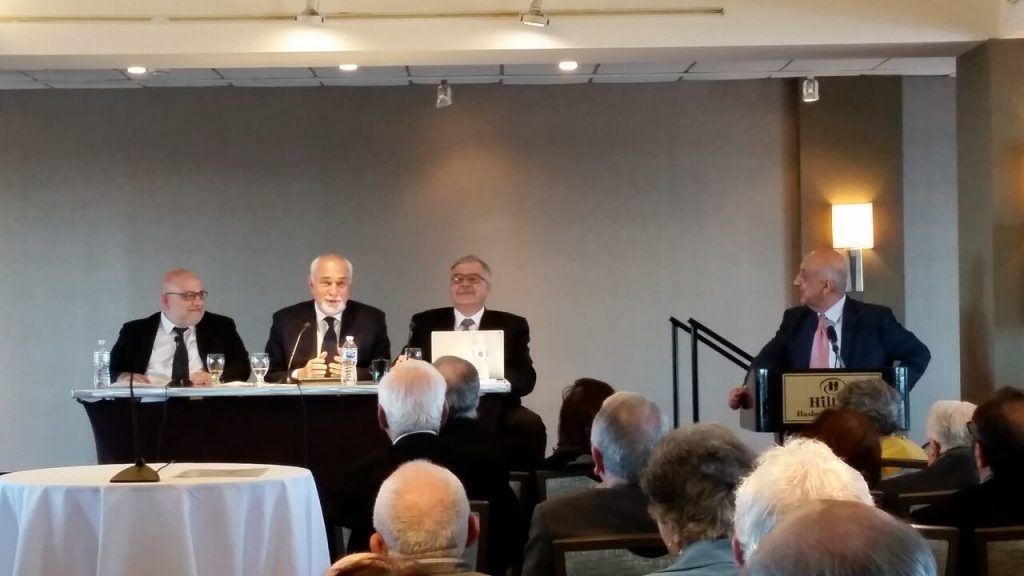HASKBROUCK HEIGHTS, N.J. (A.W.)—The Armenian Democratic Liberal Party (ADL) Armenagan-Hovsepian chapter of Greater New York-New Jersey and the Armenian Revolutionary Federation (ARF) Dro gomideh of New Jersey hosted a panel discussion on March 11, regarding the pitfalls and possibilities of Armenia’s most recent Constitutional Reforms.
The featured panelists included Hagop Der-Khatchadourian, member of the ARF Bureau and president of the International Council of Armenian National Committees; Dr. Varujan Vosganian, author of the book The Book of Whispers and Romania’s former Finance Minister and deputy in Romanian Parliament; and Sevag Hagopian, editor in chief of the Zartonk Daily newspaper, which is published in Beirut and the current secretary of the Armenian Democratic Liberal Party Central Committee.
The moderator for the afternoon was Vartan Abdo, founding director of the Armenian Radio Hour of New Jersey.
In Dec. 2015, a constitutional referendum was held in Armenia. These proposed changes to the constitution are set to change the country’s semi-presidential system to a parliamentary system when voting for a new president was to take place in 2018. Although there was opposition, this referendum successfully passed with 66.2 percent of the vote.
Now that a new President of the Republic of Armenia, Armen Sarkisian, has been elected by parliament, these changes will soon be put into effect. Whether or not they will be positive or negative for the people of Armenia cannot be predicted but discussing the possibilities and projected outcomes given the circumstances can help better anticipate what is in store for the country.
Dr. Vosganian began the discussion by focusing on the way human rights issues are proposed within the new constitution. “The constitution is transitory, a mixture of communist mentality,” he noted. In other words, according to Vosganian, the government controls the actions of its people and does not allow them the right to express how they feel or what they think. “Recently adapted Parliamentary system opens the window to disregarding and restricting basic human rights,” he went on. Because everything is open, there will be consequences towards people who try to fight for basic human rights. “The authors of the constitution don’t trust the Armenian people, they are trying to avoid any pitfalls,” he added.
According to Vosganian, Armenia should put a distinction between the politics and economy of the country, which he believes are currently too close for Armenia to be considered a true democracy. To conclude, Dr. Vosganian noted: “If the constitution isn’t implemented following a democratic system, it will be a danger to the Armenian nation and society.”
Hagop Der-Khatchadourian was next to share his thoughts on the new constitution. “Our parents fought for Armenian Genocide recognition—as we do now—but those who are conscious of their Armenian identity must also be sure that the new constitution is conscious of them and their existence,” he said. Der-Khatchadourian said that Armenians around the world must make sure that the Armenian Diaspora is included in this new constitution, because even though Diasporans do not physically live in Armenia, they are an important part of the country, since they are able to keep their Armenian identity while living outside of their homeland. Der-Khatchadourian believes that the Diaspora should be represented within the Parliament to ensure that the worldwide Armenian communities’ interests are reflected in the decisions made for Armenia.
Der-Khatchadourian went on to explain that with the new parliamentary system, Armenia’s government should work to create a system, which includes participation from all its members as well as the citizens of Armenia. This way, a democratic system will be implemented, power and responsibilities will be divided, and the people of Armenia will have a voice within parliament to voice their opinions.
The event’s final speaker, Sevag Hagopian began by noting that changes to a constitution are not only an Armenian phenomenon. “The constitution is there, it can and should be changed,” he said. According to Hagopian, the minority populations in Armenia will be protected because the law limits the powers of the government. This is seen, to analysts such as Hagopian, as a form of progress. He went on to compare the constitutional changes that took place recently in Armenia to those in Georgia, stating that they did not work well for the people and the country. “If constitutions are to change the people enforcing the changes need to change too,” he mentioned. He advised that in the future, we should consider the people of our country and the regime that best serves them. To conclude, Hagopian stated that “the new constitution should be taken to the youth so they can be aware of the changes that are being made to their country and they can use those rules to better our Armenian nation. The Armenian youth should be the change.”
After listening to the very interesting points made about the changes in Armenia’s constitution, it is obvious that Diasporan Armenians should be well aware of what is going on in Armenia and that they must work to help change something for the better. It is clear that Armenians, regardless of where they live and regardless of religious or political views, must all work together to make our country great.
Following the discussion, the audience had a chance to chime in and ask the presenters questions. A small reception also took place after the event.
The post Armenia’s Constitution: Pitfalls and Possibilities Explored at ARF-ADL Panel appeared first on The Armenian Weekly.
Source: Armenian Weekly
Link: Armenia’s Constitution: Pitfalls and Possibilities Explored at ARF-ADL Panel

